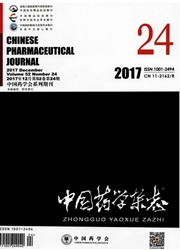

 中文摘要:
中文摘要:
磷脂肌醇(PI3K)-蛋白激酶B(PKB,Akt)-雷帕霉素靶体蛋白(roTOR)通路抑制剂耐药现象的出现,与其上下游相关联的其他癌蛋白信号通路的反馈机制密切相关。目前已经报道的有关PI3K-Akt—mTOR通路抑制剂耐药机制,基本上可以分为与FOXO和激素受体相关,依赖于MYC,依赖于β-catenin,依赖于JAK/STAT通路,依赖于MAPK通路,及与AXL相关的耐药机制。PI3K—Akt—roTOR通路抑制剂的耐药,极大地影响了该类小分子靶向药物在临床上的使用,通过对其耐药性产生的机制进行探讨和总结,为临床上和其他药物联用克服该类靶向药物耐药提供策略。
 英文摘要:
英文摘要:
The resistance to PI3K-Akt-mTOR pathway inhibitors has close relationship to the negative feedback of its context-dependent signal pathways. According to our current understanding, the resistant mechanisms could be divided into the following basic conditions: related to FOXO and hormone receptor, MYC-dependence, β-catenin-dependence, JAK/STAT pathway-dependence, MAPK pathway-dependence and related to AXL. The emergence of drug resistance to PI3K-Akt-mTOR pathway inhibitors has greatly limited their curative effect. The reported resistance mechanisms to PI3K-Akt-mTOR pathway inhibitors to search for potential strategies for overcoming resistance by drug combination were summarized.
 同期刊论文项目
同期刊论文项目
 同项目期刊论文
同项目期刊论文
 Curcumin derivative C817 inhibits proliferation of imatinib-resistant chronic myeloid leukemia cells
Curcumin derivative C817 inhibits proliferation of imatinib-resistant chronic myeloid leukemia cells Dual Inhibition of Bcr-Abl and Hsp90 by C086 Potently Inhibits the Proliferation of Imatinib-Resista
Dual Inhibition of Bcr-Abl and Hsp90 by C086 Potently Inhibits the Proliferation of Imatinib-Resista Novel Hsp90 inhibitor FW-04-806 displays potent antitumor effects in HER2-positive breast cancer cel
Novel Hsp90 inhibitor FW-04-806 displays potent antitumor effects in HER2-positive breast cancer cel 期刊信息
期刊信息
